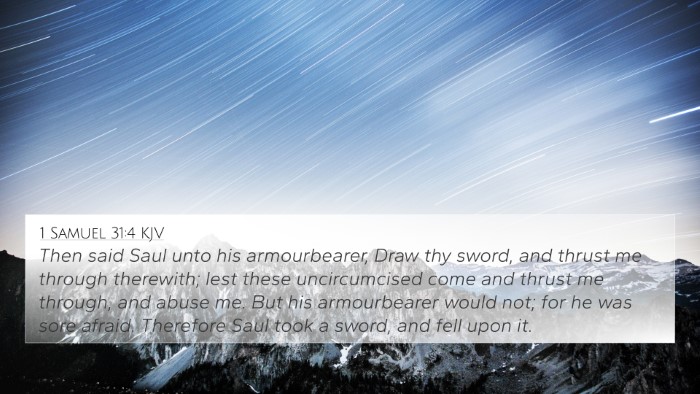Understanding 2 Samuel 1:14
Bible Verse: 2 Samuel 1:14
Verse Text: "And David said unto him, How wast thou not afraid to stretch forth thine hand to destroy the Lord's anointed?"
Verse Summary and Context
This passage occurs in the narrative following Saul's death. David, upon hearing the news of Saul's demise, encounters an Amalekite who claims to have killed Saul, thinking it would gain him favor with David. David's response reveals his reverence for God's anointed king, displaying that he views Saul’s position not merely as one of power but as divinely ordained reality.
Commentary Insights
Matthew Henry's Commentary
Matthew Henry emphasizes the gravity of David's question to the young Amalekite. He elucidates that the act of killing Saul was seen as a heinous crime, as Saul was God's chosen leader. David's inquiry not only reveals his character but also shows his commitment to honoring God's appointed authority. Henry notes that this response highlights the respect that should be shown to God’s anointed, regardless of personal disagreements or Saul's prior failures.
Albert Barnes' Notes
Albert Barnes elaborates on the implications of the Amalekite's claim, discussing the moral duty of recognizing authority set by God. He points out that the Amalekite's presumption to kill Saul, thinking it would gain him glory, resulted in his demise instead. Barnes indicates that David's reaction serves as an example of humility and respect for God's will, underscoring the principle that one should not take matters of leadership and authority into their own hands.
Adam Clarke's Commentary
Adam Clarke provides a historical contrast, discussing the implications of David's statement in relation to Saul's own failures and the ensuing consequences. Clarke notes that this moment represents a significant moral teaching against the backdrop of leadership in Israel. He regards David's reaction not only as a personal response to grief but also as a communal statement regarding the sanctity of God’s chosen leaders, setting a precedent for future generations.
Cross-References for Deeper Understanding
- 1 Samuel 16:13 - The anointing of David, establishing the sacredness of God’s choice.
- 1 Chronicles 10:13-14 - Discussing the reasons for Saul's demise, reinforcing the consequences of disobedience to God.
- Psalms 105:15 - "Do not touch my anointed ones; do my prophets no harm," echoing the theme of divine protection for leaders.
- Luke 23:2 - The accusations against Jesus, paralleling the rejection faced by God’s anointed.
- Romans 13:1 - The call for believers to submit to governing authorities, as they are instituted by God.
- 1 Peter 2:17 - An encouragement to honor the emperor, reflecting the respect due to authority figures.
- Hebrews 13:17 - Instruction to obey and submit to spiritual leaders as they watch over souls.
Thematic Connections
2 Samuel 1:14 resonates deeply with themes of authority, respect for God’s will, and the consequences of rebellion against divine ordination.
David’s stark reaction to the Amalekite serves as a foundation for understanding how believers should relate to leadership, both secular and spiritual. Each cross-reference reinforces the multidimensional nature of authority as divinely established and worthy of honor.
Comparative Bible Verse Analysis
As we explore the connections between 2 Samuel 1:14 and the cross-referenced verses, we can identify several critical parallels. For instance, just as David held the Amalekite accountable for killing Saul, Romans 13:1 similarly lays the groundwork for recognizing God’s sovereign control over rulers and authorities. This brings us into a broader conversation about the role of obedience and respect in our spiritual walk.
Conclusion
In studying 2 Samuel 1:14, we recognize a powerful principle: the importance of understanding God’s will in leadership and authority. Through a comprehensive cross-referencing of biblical texts, we gain insight into the sacred duty of respecting God's anointed. This context encourages us to apply humility and reverence in all aspects of our lives, urging us to honor those in positions of influence under God's ordained authority.








